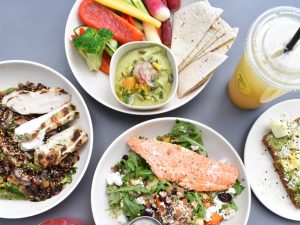The Black consumer market is clamoring for healthy, well-sourced, ethical foods, says data from the McKinsey Institute for Black Economic Mobility.
Black consumers' food expenditures are expected to increase 5% per year for the next eight years. By 2030, they'll be spending $340 billion in the market. McKinsey notes that this increase in cash flow means that companies should start taking this block of consumers’ needs into account sooner rather than later, if they haven’t already. According to McKinsey's research, Black consumers are looking to enable healthy habits, have convenient access to food, and have new food experiences that are still culturally relevant to their varied identities.
Healthy eating is more important to Black consumers than non-Black consumers; they are more than twice as likely as the general population to be vegetarian or vegan (8% vs. 3%). They prioritize organic food options, and more of their grocery money is spent on fresh produce, meat, and seafood than frozen food. Additionally, Black respondents are up to 15% more likely to value restaurants that use "clean" ingredients or fresh ingredients that are free from additives. McKinsey's report adds that despite this desire for healthy food, many brand strategies cater to Black and Latino consumers in lower-income areas, promoting highly processed and unhealthy foods. This means that even if Black consumers wanted healthier foods, their access is restricted by food deserts bolstered by the influence of fast food and frozen food brands.
McKinsey’s research also shows that Black consumers want foods that simultaneously tie into their cultural heritage and allow them space to try something new. Black respondents were twice as likely as non-Blacks to seek restaurants related to their national heritage. This is an unsurprising statistic, as Pew Research reports that one in ten Black citizens is an immigrant or first-generation American. Black respondents are also four times as likely to support a Black-owned food business as they are a non-Black-owned food business. However, Black consumers are interested in trying out new types of food and exploring new tastes. Ideally, McKinsey says, these new experiences would come presented by a familiar or relatable face to both solidify the product's foundations in Black culture and provide a novel experience.




















